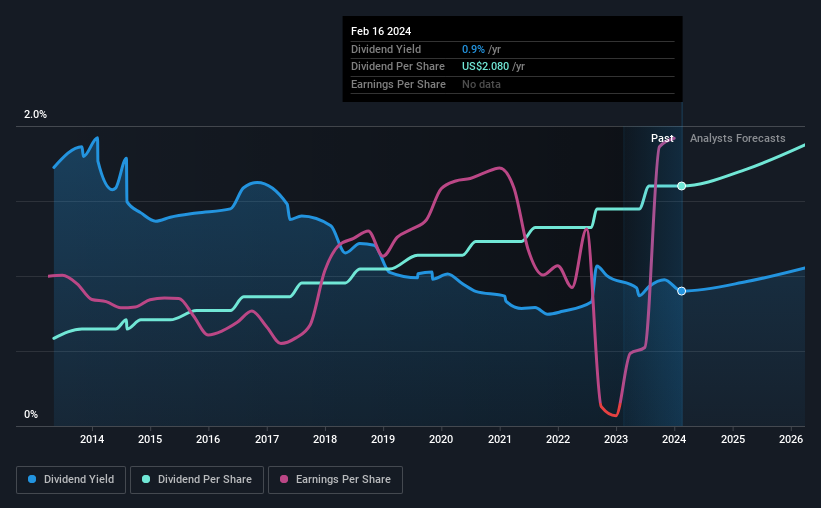There's A Lot To Like About STERIS' (NYSE:STE) Upcoming US$0.52 Dividend
Readers hoping to buy STERIS plc (NYSE:STE) for its dividend will need to make their move shortly, as the stock is about to trade ex-dividend. The ex-dividend date is one business day before a company's record date, which is the date on which the company determines which shareholders are entitled to receive a dividend. The ex-dividend date is important because any transaction on a stock needs to have been settled before the record date in order to be eligible for a dividend. Thus, you can purchase STERIS' shares before the 22nd of February in order to receive the dividend, which the company will pay on the 22nd of March.
The company's next dividend payment will be US$0.52 per share, and in the last 12 months, the company paid a total of US$2.08 per share. Based on the last year's worth of payments, STERIS has a trailing yield of 0.9% on the current stock price of US$231.23. If you buy this business for its dividend, you should have an idea of whether STERIS's dividend is reliable and sustainable. We need to see whether the dividend is covered by earnings and if it's growing.
Check out our latest analysis for STERIS
Dividends are usually paid out of company profits, so if a company pays out more than it earned then its dividend is usually at greater risk of being cut. That's why it's good to see STERIS paying out a modest 35% of its earnings. A useful secondary check can be to evaluate whether STERIS generated enough free cash flow to afford its dividend. Thankfully its dividend payments took up just 33% of the free cash flow it generated, which is a comfortable payout ratio.
It's positive to see that STERIS's dividend is covered by both profits and cash flow, since this is generally a sign that the dividend is sustainable, and a lower payout ratio usually suggests a greater margin of safety before the dividend gets cut.
Click here to see the company's payout ratio, plus analyst estimates of its future dividends.
Have Earnings And Dividends Been Growing?
Companies with consistently growing earnings per share generally make the best dividend stocks, as they usually find it easier to grow dividends per share. If earnings decline and the company is forced to cut its dividend, investors could watch the value of their investment go up in smoke. For this reason, we're glad to see STERIS's earnings per share have risen 11% per annum over the last five years. Earnings per share have been growing rapidly and the company is retaining a majority of its earnings within the business. Fast-growing businesses that are reinvesting heavily are enticing from a dividend perspective, especially since they can often increase the payout ratio later.
Many investors will assess a company's dividend performance by evaluating how much the dividend payments have changed over time. STERIS has delivered an average of 11% per year annual increase in its dividend, based on the past 10 years of dividend payments. Both per-share earnings and dividends have both been growing rapidly in recent times, which is great to see.
Final Takeaway
From a dividend perspective, should investors buy or avoid STERIS? STERIS has been growing earnings at a rapid rate, and has a conservatively low payout ratio, implying that it is reinvesting heavily in its business; a sterling combination. There's a lot to like about STERIS, and we would prioritise taking a closer look at it.
In light of that, while STERIS has an appealing dividend, it's worth knowing the risks involved with this stock. For example - STERIS has 1 warning sign we think you should be aware of.
Generally, we wouldn't recommend just buying the first dividend stock you see. Here's a curated list of interesting stocks that are strong dividend payers.
Have feedback on this article? Concerned about the content? Get in touch with us directly. Alternatively, email editorial-team (at) simplywallst.com.
This article by Simply Wall St is general in nature. We provide commentary based on historical data and analyst forecasts only using an unbiased methodology and our articles are not intended to be financial advice. It does not constitute a recommendation to buy or sell any stock, and does not take account of your objectives, or your financial situation. We aim to bring you long-term focused analysis driven by fundamental data. Note that our analysis may not factor in the latest price-sensitive company announcements or qualitative material. Simply Wall St has no position in any stocks mentioned.

